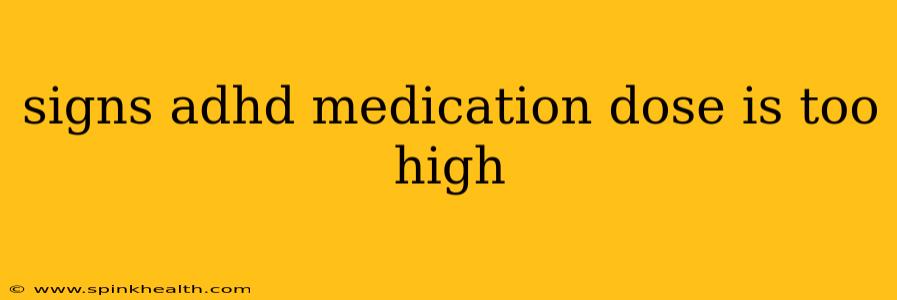ADHD medication can be a game-changer for many, but finding the right dose is a delicate balancing act. Too little, and you might not experience the benefits; too much, and you could face unpleasant side effects. This journey of finding the sweet spot often involves trial and error, guided by your doctor. Let's explore the telltale signs that your ADHD medication dose might be too high. This isn't a substitute for medical advice; always discuss any concerns with your prescribing physician.
My journey with ADHD medication started much like many others. I felt overwhelmed, scattered, and unable to focus. My doctor prescribed medication, and the initial results were promising. But as the weeks went by, I started to notice something wasn't right. It wasn't just about the medication's effectiveness; it was about the side effects. This article shares my experiences and what I learned about recognizing the signs of an overly high dosage.
Common Signs Your ADHD Medication Dose Might Be Too High
Many people experience some side effects on ADHD medication, but if they become severe or debilitating, it might signal that your dose is too high. Here are some key warning signs:
1. Insomnia or Difficulty Sleeping:
This is a very common side effect of stimulant medications like Adderall and Ritalin. If you're finding it impossible to fall asleep, or you wake up frequently throughout the night, your dose could be too high. The racing thoughts and increased energy can interfere with your sleep cycle, leading to exhaustion during the day. This isn't just about a few restless nights—it's about a consistent pattern of poor sleep.
2. Increased Anxiety or Irritability:
While ADHD medication can help with focus, a dose that's too high can paradoxically increase anxiety and irritability. You might find yourself feeling more on edge, easily frustrated, or prone to sudden outbursts of anger. This heightened emotional sensitivity isn't characteristic of effective ADHD management and could point towards an over-medication issue.
3. Significant Appetite Suppression:
Many ADHD medications suppress appetite. While some reduction is normal, excessive appetite suppression can lead to weight loss, malnutrition, and overall health problems. If you're struggling to eat or maintain a healthy weight, it’s crucial to discuss this with your doctor.
4. Rapid or Irregular Heartbeat (Palpitations):
This is a serious side effect that requires immediate medical attention. If you experience a rapid or irregular heartbeat, dizziness, or chest pain, seek medical help immediately. This could indicate a dangerous interaction or an excessive dose.
5. High Blood Pressure:
Some ADHD medications can elevate blood pressure. Regular monitoring of your blood pressure is vital, particularly if you’re on medication. A significant or persistent increase in blood pressure could indicate a need for dosage adjustment.
6. Headaches:
Frequent and intense headaches could be a sign of an overdose or adverse reaction to your medication. While occasional headaches are common, persistent headaches are a cause for concern.
7. Nausea or Vomiting:
These gastrointestinal side effects are not uncommon, but severe nausea or vomiting can signal a problem. This might require an adjustment in the dose or even a change in the medication.
8. Increased Restlessness or Tics:
While the medication aims to reduce hyperactivity, an overly high dose could paradoxically lead to increased restlessness, tremors, or the development or worsening of tics.
9. Severe Stomach Pain:
While some mild stomach upset can occur, severe or persistent stomach pain needs immediate medical attention.
What to Do If You Suspect Your Dose Is Too High
Do not adjust your medication dose on your own. This is incredibly important. Always consult your doctor or psychiatrist before making any changes to your medication regimen. They can assess your symptoms, monitor your vital signs, and make adjustments as needed.
They might suggest lowering your dose, changing the medication, or adjusting the timing of your medication intake. Open and honest communication with your healthcare provider is key to finding the right balance and managing your ADHD effectively.
Remember, finding the optimal dose is a process. It requires patience, careful monitoring, and open communication with your doctor. Don't hesitate to reach out if you have any concerns – your health and well-being are paramount.

